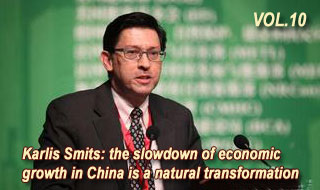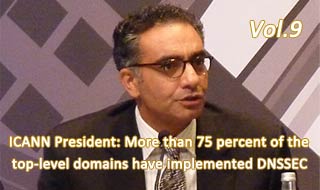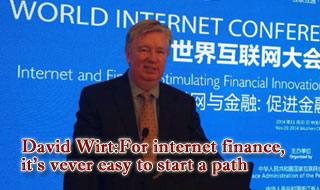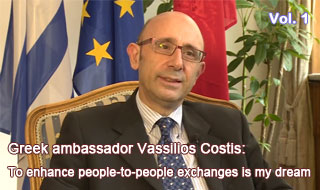 Swiss Ambassador: I am proud of bringing in Switzerland as a prospective founding member of the AIIB
Swiss Ambassador: I am proud of bringing in Switzerland as a prospective founding member of the AIIB
GMW.cn: Year 2015 is the 65th anniversary of the establishment of diplomatic ties between China and Switzerland. During the past 65 years, regular high-level visits between the two countries have been conducted. Since 2010 China has been Switzerland's most important trading partner in Asia. In the following years, what new progress in bilateral relationship do you expect China and Switzerland to achieve?
Jean-Jacques De Dardel: Certainly, more of the same at an ever-higher level. We have developed very good productive ties in the commercial and financial fields, but also political exchanges, cultural exchanges. We have political exchanges as you have mentioned high-level visits. We are very happy to receive Premier Li Keqiang in Switzerland early this year around the Davos Forum. He had already paid his first visit to European countries in Switzerland a year before that. This underlines the fact that we are close partners. And indeed, Switzerland happens to be, as everyone knows, a rather small geographic and demographic entity. But on the other hand, it is the world 20th economy. So we have a certain economic power base, from which we can expand a partner-oriented hand to China. I am happy to report that in the early part of this year, up to now, Switzerland is actually the 7th source of imports for China, which is quite remarkable for a country of such a size. This goes to show that when we learn about each other, when we have an interest in each other, there is a lot to do.
So this 65 years of productive relationship is symbolic, but more than symbolic. Ever since, a lot has been done in the way of “firsts”. We were absolutely the very first countries to recognize People’s Republic of China in January 1950. But ever since, in different fields, there have been “firsts”. The first Free Trade Agreement with European countries is one of the last “firsts”. But we were also the first to establish a town-to town sister partnership in 1980, very early on. We were also the first European country which acknowledged China as a market economy. And it goes on. I am not coding that because it would be telling as nice references, what I do like to underline is that time and again decision makers have bet on China, and on Switzerland and China. This is giving rise to substance in our relationship. And obviously, this is going to go on with a number of establishments that people are looking into to make more fruitful results. And now the special focus on 65 years of relationship is just a way of bringing new commence to this ball game that we would like to play together.
GMW.cn: It has been nearly two years since the free-trade agreement between China and Switzerland was signed in Beijing. How did our two countries benefit from this agreement? What new difference can it make in the future?
Jean-Jacques De Dardel: They both benefited already in negotiation process, because ours is a very extensive agreement, which covers all fields and all walks of life. It goes well beyond trade. The negotiation process was very intensive. In two and a half years, we reach what China was not able to reach with other partners, which Switzerland is not able to reach in all cases with its other free trade agreement partners around the world. So we benefited from additional knowledge and focus on each other. Obviously, the figures and statistics go on showing that our trade is expanding, as I have told you that our export to China in the first half of this year is very strong. The statistical kick-in of free trade agreements is neither a reason for say, an objective for say, nor is it that this stage particularly remarkable. We don’t even have a year of entry into force to show what the real effect is. What we do know is that because of the very extensive scope of the free trade agreement, a lot of the additional interest and focus of the business leaders in both countries have been drawn to the picture. And I hear more and more about Chinese investors get interested in Switzerland. And Chinese companies want to establish business here or widen their presence. We already have about a thousand establishments here in China. So I expect this ease our doing business with each other to the sure grand tour of fruitful cooperation, under the benevolent eye of authorities on both sides, which have done their rights to make that happen. And if I refer to our previous experience with other countries which we sign free trade agreements, there is no exception to the rule until now – Free trade agreements do bring more and better exchanges and trades. So this is certainly what I expect.
GMW.cn: You have been Swiss Ambassador to China for more than a year. In terms of what you have done to enhance bilateral exchanges, what achievements are you most proud of?
Jean-Jacques De Dardel: Taking over such a large embassy, this is our largest embassy in the world, is not like taking over a little speed boat and going into another direction. This is a very respectable cruiser, which you take command with full respect of what has been achieved. So I am very proud to be part of this game, and part of this team. This has been said. Yes, we can derive strengths from the speed of growth and dynamism of China and apply to ourselves, and do as much as possible. But the activities of this embassy are widening and progressing in such a way that we remain active day in and day out. And I am happy to report about the special programs that have been set in place because it is the 65th year. So it is a lot of more and more creations, bringing in cultural points of contact between our two countries. But if I am going to point to a specific element I am happy about, it would be paradoxically something wider than just bilateral relationship. That is to bring in Switzerland as one of the very first potential founding members of the Asian Infrastructure Investment Bank. That most probably has been helped by the work of our embassy.
GMW.cn: You have visited many provinces and cities in China recently. What impressions do these places leave on you? What is the most unforgettable among these journeys?
Jean-Jacques De Dardel: Yes, I have visited as many as I could. I have been moving about as much as I could. I visited already, in a little of over a year, about twenty-two provinces and autonomous regions, over thirty cities. A number of times in each of them. And every time, I feel that I still have so much more to see. This country is huge and diverse. Everything remains to be discovered for myself. What I have been most impressed with? In general terms, everywhere is of the same kind of dynamism. This country is moving forward at a very fast pace. I discovered China about thirty years ago. So I measured the distance in time, the change, the pace of change. And I am most impressed everywhere by everything that is self-evident, very visible in infrastructure. The general arrival of times of possible effluence of society is developing a sense for a better future for themselves. All of that is wonderful. Then the scenes of beauty, the meetings, but what made a real mark on me is something actually very minute, compared to the size of the country. In the vast expanse of the Tibetan Regions of China, in Qinghai actually, I visited an orphanage which is supported by Swiss interests and run by Tibet itself, with the approvals of central and local authorities. There I sensed the joint happiness of the orphans in the setting that was marvelous, stupendous and magnificent. All of that reflects optimism. So I like that very much. So you see something non-official for the rest of my time. Of course, I spend a lot of time meeting officials and I am always encouraged by what I hear and the personalities that I get to meet.
GMW.cn: Switzerland is acclaimed for environment protection, which has been imbedded in Swiss people’s minds. What can China learn from Switzerland in this regard?
Jean-Jacques De Dardel: It can learn from our own mistakes. You’re right, it is deeply imbedded in our souls and our approaches to nature and the way we develop ourselves. That is most specifically because we early on came to points where we thought we could not go on like this, because this is bad for environment. So we invest a lot of time and brain power into making things work both for development and for nature. So, in this sense, we are also very keen to exchange notes and information and perhaps advice for others who are here. We do not get a quick fix, but get it right from the start, when it comes to protect the environment after your incredible pace of development has approached on environment so much. Pollution here is really a problem and naturally a problem for the whole world, given the size and importance of China in the world. So, yes, we tend to develop programs to share knowledge, develop expertise, and, for instance, developing a program with ten cities, major and second tier cities, so as to promote low-carbon cities, programs, a better organization, better waste and water management and the like. Not that we think we can change the world by ourselves, but we can bring in some knowledge and expertise to the ones who will be able to change the world by changing their own cities.
GMW.cn: When you first came to China, we were in the early years of economic reform. Thirty years later, you come back when the new leadership in China launches a significant political and legal system reform. Both of the years are historically influential. What is the most impressive to you in terms of China’s reforms?
Jean-Jacques De Dardel: The results of the reforms are what I found the most impressive. As I understand it China has long been in the process of reforms, and goes from one reform to the other actually, like many other countries, many other parts of the world, which are prone to reforming their ways in one or other direction. What I do sense is that there are a lot of positive movements in this field, which has unleashed the potential of the Chinese. I have long been struck when I was outside China by the fact that in most countries, not all countries actually, where you have a Chinese community. That community is a successful one. It creates name for itself. And it is obviously very productive. And for a long time, in former times, I did not have that same feeling as I looked into China. Today, I found that, as I said, potential has been absolutely unleashed. People are able to manage their own destiny in economic and social logical terms. The Chinese are extraordinarily diligent, productive, hard-working. And this makes a mark on the world. I remember when a generation ago, our GDPs, the Swiss and Chinese, were equal. Actually 35 years ago, the Swiss GDP was 25% above China, which was not normal. Now, yours is more than ten times than ours. That is normal. And it is going to grow still. I like to know that. We don’t like to position ourselves just on a scale. We like to have partners who are getting stronger, with whom we can have a better relation. That is what drives me to optimism.
Jean-Jacques de Dardel
Swiss Ambassador to China
Jean-Jacques de Dardel, Ambassador to The People's Republic of China, to Mongolia and the DPRK since February 2014. Previously Ambassador to France and Monaco (2011-2014). Head, Swiss Mission to NATO and Ambassador to Belgium. Former Head of the Swiss DFA Division in charge of Europe, Central Asia, Council of Europe and OSCE. In 2001, he founded and directed the DFA Centre for International Security Policy. Ambassador to the Organisation internationale de la Francophonie until 2000, previous postings in Paris, Canberra, Washington, Vienna, Bern.More>>
- "I discovered China about thirty years ago. So I measured the distance in time, the change, the pace of change. And I am most impressed everywhere by everything that is self-evident, very visible in infrastructure."
- "But if I am going to point to a specific element I am happy about, it would be paradoxically something wider than just bilateral relationship. That is to bring in Switzerland as one of the very first potential founding members of the Asian Infrastructure Investment Bank."
- "I am happy to report that in the early part of this year, up to now, Switzerland is actually the 7th source of imports for China, which is quite remarkable for a country of such a size. This goes to show that when we learn about each other, when we have an interest in each other, there is a lot to do."
Consultant producer:Zeng Fanhua
Designer: Zhou yueqin
Art Editor: Li Wenfeng
Executive Editor:Zhou Yueqin














